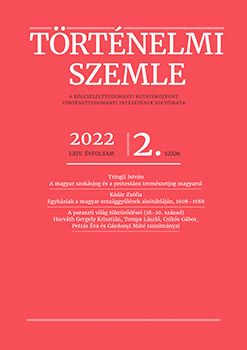Törpebirtokostól az óriás uradalomig. A szerződéses jobbágyság Veszprém, Sopron, Borsod és Bihar vármegyékben
From Smallholders to Giant Estates. Contract Tenant Peasantry in the Counties of Veszprém, Sopron, Borsod and Bihar
Author(s): László TompaSubject(s): 18th Century
Published by: Magyar Tudományos Akadémia Bölcsészettudományi Kutatóközpont Történettudományi Intézet
Keywords: peasantry; regulation of seigneurial dues; contract; Maria Theresia; taxation; praestatio; counties
Summary/Abstract: One of the groups of sources that can most profitably be used for the examination of the argarian population of Hungary in the early modern era is the archival legacy of the regulation of seigneurial dues ordered by Queen Maria Theresia. Alongside the quantitative data, the responses given to the points of the inquiry shed light on the living and legal conditions of the most characteristic group within the eighteenth-century peasantry, that of contract tenants. While part of the jobbágy-peasantry and as such excluded from the noble nation and from all kinds of political and economic power, this group of the subjected population nevertheless theoretically enjoyed exceptionally wide guarantees in everyday economic activity as opposed to the lord’s economy, with which it lived in an uneasy harmony, sometimes conflicting, and to the lord himself. Based on the material of four counties (Veszprém, Sopron, Borsod, Bihar), the paper explores the regional patterns of contract tenant peasantry in 887 settlements, as well as their ethnic, social and economic features, and those of the lords who dominated them. It likewise explores the proportion of landless peasants and resettled ethnic minorities, prevailing landholding forms, and the issues of serfdom and freedom in correlation with the contract relationship. Through a qualitative analysis of the responses given by the population at the time of the regulation, the paper also explores the formal characteristics of contract-making, offering a „typology” of such contracts by ordering the different contracts into a system.
Journal: Történelmi Szemle
- Issue Year: 2022
- Issue No: 2
- Page Range: 269-293
- Page Count: 25
- Language: Hungarian

